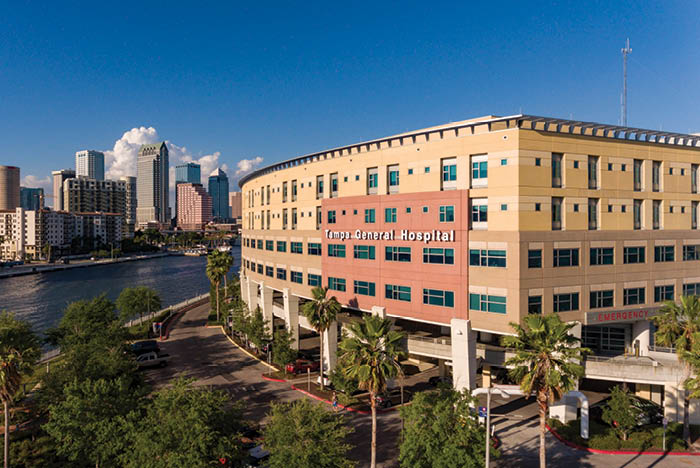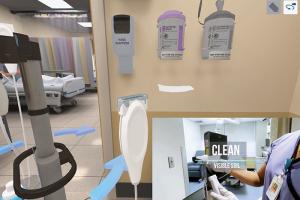Tampa area hospitals partner, share data to combat COVID-19

Fifty Tampa-area hospitals have partnered to help track and contain the spread of COVID-19.
Image courtesy of Tampa General Hospital
Health care facilities sometimes compete for patients. However, in times of crisis such as the current pandemic, collaboration becomes essential to reducing risks, increasing efficiencies, and treating patients safely and effectively.
Case in point: Tampa General Hospital recently partnered with 50 hospitals throughout Southwest Florida to share and aggregate real-time COVID-19 data via an interactive dashboard implemented by SME Solutions Group Inc., a Tampa-based technology solutions provider.
The dashboard — called the COVID-19 Florida West Coast Regional Data Exchange and powered by Qlik software that aggregates the data — shows COVID-19 testing results by ZIP code, tracks occupancies, analyzes trends based on the area, and properly forecasts usage of resources throughout the Tampa Bay region. Hospital administrators can parse data on available ICUs, non-ICUs, negative-pressure rooms, ventilators and other medical equipment, as well as coronavirus patient numbers by county, health system and individual facility.
The numbers shared across the data exchange help drive decisions in the Tampa Bay area and Southwest Florida related to reopening efforts, mask ordinances and other public health measures. Hospitals report data to the exchange daily, and the dashboard illustrates long-term trends using graphs that show how patient and resource levels have changed throughout the pandemic.
Other regional health systems participating in the collaboration include AdventHealth, BayCare Health System, HCA Healthcare, Lakeland Regional Health, Lee Health and Manatee Memorial Hospital.
“Our hospital uses data in artificial intelligence every day to improve patient flow within our walls,” says Etter Hoang, director of data analytics for Tampa General Hospital. Hoang adds that the facility is also collaborating with IBM to create projection models that forecast trends in the pandemic. Last year, Tampa General Hospital partnered with GE Healthcare to develop CareComm, a clinical command center that uses artificial intelligence and predictive analytics to more efficiently care for patients, which has been another tool in the pandemic fight.
“SME provides data-hosting solutions that allow our facility to share data with parties outside of our hospital using secure cloud-based technology,” Hoang says. “Since Tampa General Hospital was already working with SME on other initiatives, our existing relationships streamlined the process of getting the data exchange up and running.”
Peter Chang, M.D., vice president of care transitions for Tampa General Hospital, says that the dashboard significantly reduces coronavirus transmission risks.
“Early on during the pandemic, we saw COVID-19 spreading in some of our long-term care facilities throughout the region,” Chang says. “As those patients were hospitalized, the data exchange gave us the ability to distribute COVID patients across hospitals and hospital systems to help ensure that no one facility or health system was overwhelmed by an influx of COVID patients.
“Additionally, the models generated from the data on the dashboard have helped county leaders, state health officials, and area hospitals predict and prepare for spikes in COVID-19 cases,” Chang adds.
For example, the data exchange has been used by the Hillsborough County Emergency Policy Group, Hillsborough County Department of Health and others.
Christopher Moyer, president/CEO of SME Solutions Group, says the data exchange was carefully designed.
“By being able to display COVID results in an interactive dashboard, users can inform themselves on where the virus is spreading most and at what rate. Data is a powerful thing, and having the right tools and expertise to harness, visualize and make sense of the data is a key to success in the health care space,” Moyer says. “It’s great that community leaders also can analyze and make informed decisions based on the data. It demonstrates that data-driven and data-informed decision-making is not just for business.”
Hoang insists that collaboration is the most critical component to making the dashboard work.
“This project was innovative not only from a technological standpoint but also from a cultural standpoint. By working together with our competitors, we can use data and technology to improve public health,” Hoang says. “We hope this will open the door to future partnerships and collaboration.”




